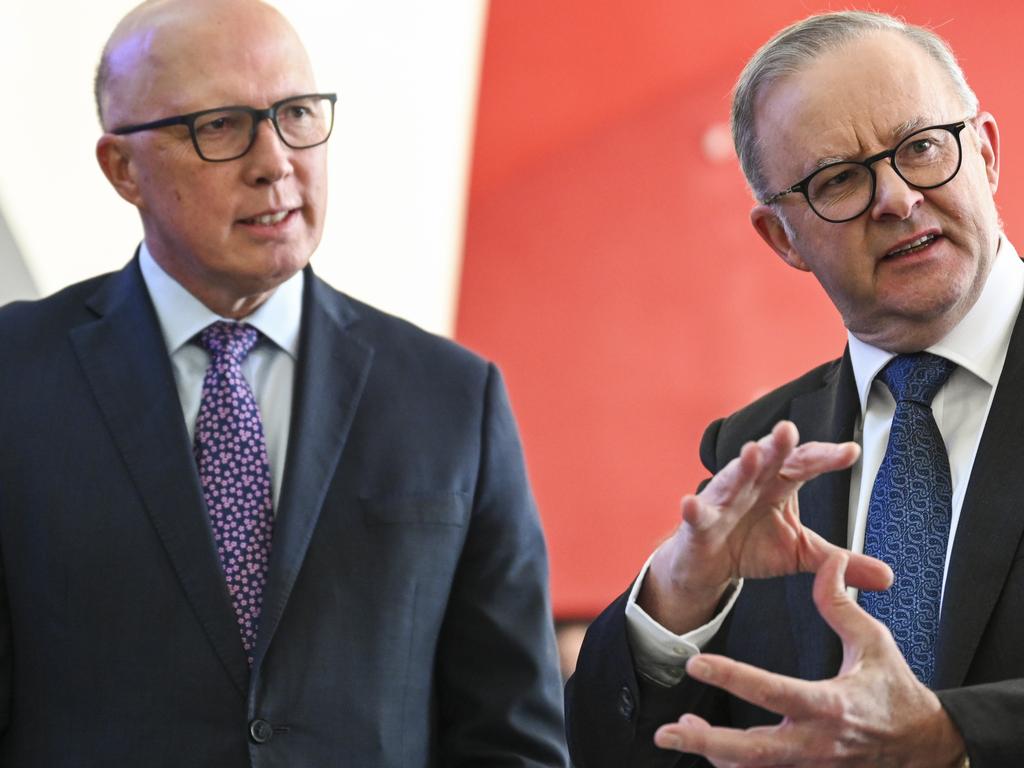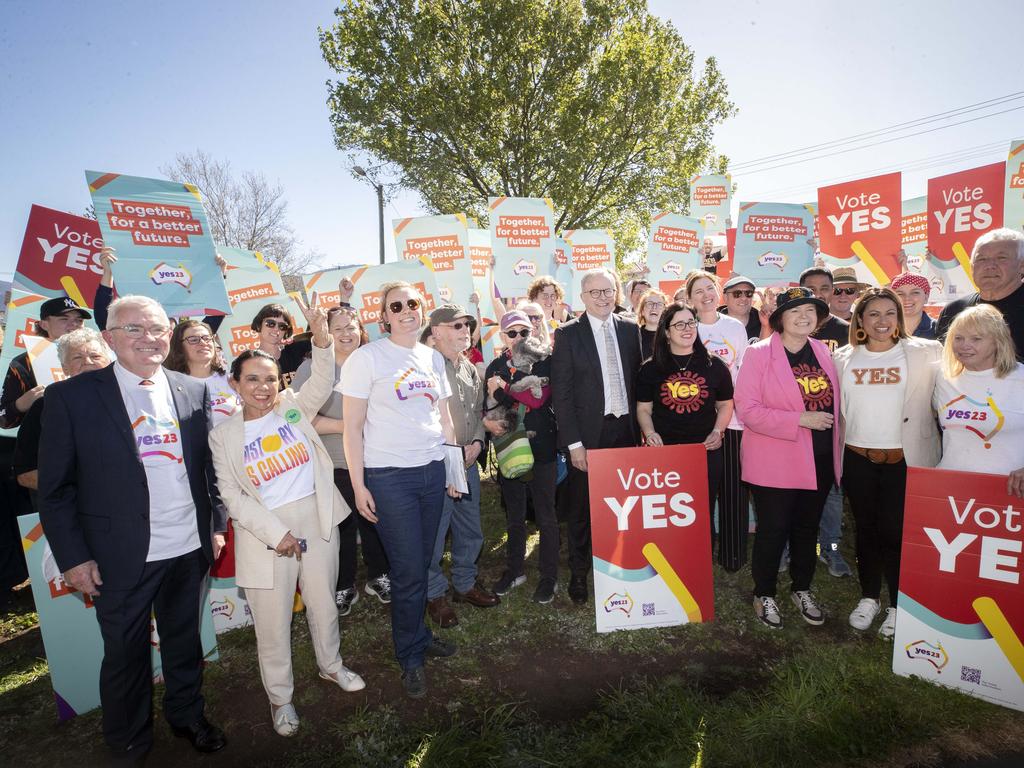Indigenous voice to parliament Yes case can’t escape its own fatal contradictions


We don’t have to come together on policy, for bipartisanism in support of bad policy is disastrous. But we should acknowledge that most people who participated in this debate, on both sides, did so with goodwill towards the nation and goodwill towards Indigenous Australians.
This in fact is why the Yes campaign was so grievously misled by the early polling that showed overwhelming support for the voice. These polls didn’t accurately measure support for changing the Constitution. They measured instead the pure goodwill to Indigenous Australians. It has been a fatal slander by the Yes case to argue goodwill to Indigenous Australians requires everyone to vote Yes, that people voting No can be motivated only by ignorance or malice – a typical identity politics false binary.
Foreign policy expert Owen Harries taught students that to prevail in an intellectual disagreement you must answer your opponent’s arguments at their strongest point.
The Yes case and pro-Yes commentators haven’t done this at any stage. They have ignored or grossly misrepresented the arguments of the No case.
On the ABC’s Insiders program on Sunday, one commentator (for whom in general I have the greatest professional respect) remarked that the No case consisted entirely of non sequiturs that he couldn’t even follow. That’s not only palpably decrepit intellectually, it’s a perfect way to lose the argument.
Misrepresenting or dismissing your opponent’s argument works only if your opponent is not going to get a hearing. Yes activists would have liked that, but Peter Dutton’s decision to oppose the voice and Jacinta Nampijinpa Price’s brilliant advocacy for the No case mean that wasn’t so.

The Yes case could still win. It’s spending hundreds of thousands of dollars a day in NSW and Victoria. Big money talks in politics. But enshrining racial distinctions in citizenship into the Constitution is such a bad idea that once it is seriously opposed, support for it declines rapidly.
The Yes case can’t escape the contradictions at the heart of its advocacy. On the one hand, the Prime Minister and other Yes campaigners tell us this is a modest change, nothing more than one more advisory committee, it will have no effect on the vast majority of Australians. Yet on the other hand they tell us that only through this constitutional change can our nation heal, Aboriginal disadvantage be addressed and our country continue to be respected internationally. Those two propositions can’t be true simultaneously.
The Yes case tells us that voting No means there will be no change. It’s a vote for the failures of the status quo. This is surely the most ridiculous non sequitur of all. The precise figures are in dispute but certainly billions of dollars are spent on Indigenous people and programs each year.
I don’t think anyone begrudges this expenditure if it’s effective. It’s not effective. Who is in control of it? The Albanese government, which already has countless Indigenous advisory bodies. Are we really to believe that one more Indigenous advisory body will change all this but will be able to do so only if it’s enshrined in the Constitution, with all the problems that brings, and nothing else is worth trying?
Price’s suggestion of an immediate audit of all this expenditure is a good one. Failure to get the voice will be no excuse for the Albanese government not to do whatever is necessary in Indigenous policy.
Similarly, the Yes case simply asserts, without ever demonstrating, that there would be no High Court litigation, no new process delays or unintended constitutional consequences from the voice. This is against all Australian constitutional experience.
In administrative law, activist judges frequently reverse a ministerial decision by finding that the minister failed to give sufficient consideration to the views of some body they are supposed to consult. With the voice having a right to consultation in the Constitution, the potential for delay, cost escalation and utterly unpredictable constitutional fallout is obvious.
The Prime Minister asserts it’s ridiculous to think the voice would want, or have, a say on defence policy. But activists involved in design of the voice explicitly do want joint sovereignty or some such nonsense. Certainly it’s not remotely far-fetched to imagine an activist body arguing that sacred lands would be defiled by the presence of nuclear-powered submarines, or fighter bombers, or the like.
The whole Yes construct that this is a campaign by the marginalised against the powerful is colossally absurd and a complete reversal of the truth. This is a campaign of massive institutional power – the government, the ABC, the richest corporations, trade unions – all attempting to browbeat and morally coerce the Australian people into voting Yes. A No vote will be a magnificent declaration of independence by voters.
The biggest factor convincing people to vote No is the concern that the voice, and the insertion of racial categories into the Constitution, will divide rather than unite Australians. In coming to this conclusion the Australian people are demonstrating the wisdom of crowds. Injecting racial categories into the Constitution guarantees that our politics will revolve around the sterile and deadly culture of identity politics. People are right to reject that.
The second big factor is a perfectly sensible concern that a Yes vote will come with other costs – instability, financial liability, unintended consequences. The third factor is deep respect for the stability of the Constitution. The Yes campaign never dealt meaningfully and respectfully with any of these issues.
The fourth dynamic changing people to No voters has been Price and Nyunggai Warren Mundine demonstrating that not all Indigenous Australians support the voice.
Price’s superb advocacy of a new way of doing Indigenous politics is the single most positive, hopeful development in this field in many years. If the Liberal and National parties don’t develop the Price insights into a general approach they are even dumber than they sometimes look. Price offers the insight that advancement for Indigenous people is neither primarily a constitutional question nor even narrowly a political one. It surely involves good access to services, but it also involves individual agency, economic advancement, productive integration into all the opportunities of a modern society.
Help to overcome disadvantage is one thing. Making disadvantage your raison d’etre, creating a permanent grievance industry, is something altogether different. In the end, Australia is not one nation for two peoples. It’s one nation for many, many people, all of them absolutely equal in civic status.







Whichever side wins the voice referendum – Yes or No – the tone leaders of both sides take on the night of the vote count and immediately after will be of great consequence for Australia.